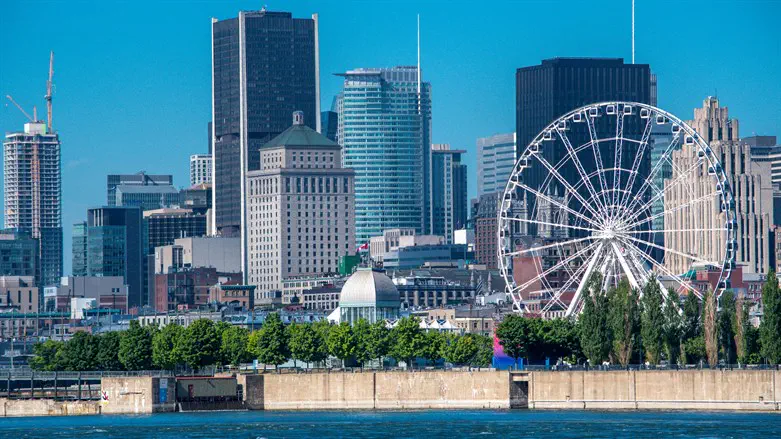
Language and Bilingualism
The majority – minority equation is a central axiom for both Israel and Canada. The Jews are an 80 per-cent majority in Israel, with Arabs and other communities the remaining 20 per-cent proportion; the French in Canada as a whole number slightly more than 20 per-cent, while in Quebec the French constitute over 70 per-cent of the total population. That figure fits their proportion in the greater metropolitan area of Montréal.
Both Quebec and Israel are the product of a distinct identity and historic struggles. They invest cultural and financial resources to promote their national languages – French in Quebec, Hebrew in Israel. While Israel's predicament is manifestly existential, that of Quebec is political in essence.
Both the Jews of Israel and the French in Canada - not only in Quebec – are part of a broader linguistic space globally. Jewish diaspora communities are extensively involved in the national drama of building the Jewish homeland; and the international francophonie organization of 54 members resonates with vibrancy and scope to invigorate the surviving French fact of la Nouvelle France in Canada.
Statistics demonstrate that two-thirds of people in Greater Montreal speak French as their primary language, while 85 per-cent of all residents are fluent in French. Clearly, Montreal is an exceedingly and noteworthy bilingual city. Indeed, for an Anglophone to be fluent in French should be a status symbol. For a Francophone to be fluent in English is an all-embracing North American necessity and experience.
Sanctions and Costs of Bill 96
What is the proper balance between the collective rights of the French population and the individual rights of citizens and residents to employ and be educated in English? Will Bill 96 inhibit potential immigrants choosing Quebec as their residence, and will it damage Quebec's relations with companies, both Canadian and foreign, because of French linguistic requirements? The new bill may catalyze an exit of many Anglophones to Ontario. Is this the goal of the Quebec government?
When the political controversy regarding Quebec separatism erupted in the 1970s, hundreds of thousands left, businesses relocated elsewhere. Toronto gained economic and demographic ground at Montreal's expense.
The interests of Quebec are hardly less important than the values it seeks to promote. Indeed, Quebec's minister in charge of French, Jean-François Roberge, acknowledged a transition period as public services adjust to Bill 96. Tens of townships have declared that their practice of bilingualism will continue despite the unilingual provisions demanded by the new Bill. Thus, the rhythm of life in Quebec may blunt the letter of the law.
Arabs and Arabic in Israel
In 2018, the Knesset in Jerusalem passed the Nation-State Law that defined Israel – as in the Proclamation of the State in 1948 – as a Jewish state. While Arabic enjoys a special linguistic status and publicly funded education, the country resonates with an indisputable Jewish national character.
The Arab minority in Israel has promoted its integral Palestinian Arab identity unencumbered by the official Jewish identity of the country. As the seasoned Member of Knesset Ahmed Tibi told President Rivlin in 2019: "We [the Arabs] are the owners of this land." Polls show that approximately 70 per-cent of the Arab citizenry reject Israel's right to maintain a Jewish majority. Widespread violence against Jewish persons and properties is a social scourge, no less the role of Arab criminal gangs murdering fellow Arabs, 135 persons so far in 2023.
Although trust is often absent, the pattern of daily life in Israel offers nexuses in the work environment and public space for Jews and Arabs to co-exist amicably.
Protecting the Majority
The differences far exceed the similarities in the Quebec and Israel majority–minority cases.
The English and Allophones do not oppose a French majority and the promotion of the French language in Quebec; the Arabs, learn Hebrew, but demand that Arabic be equal in status.
The English acknowledge the historic primacy of les Québécois de souche (descendants of original French colonists); the Arabs negate the ancient roots of Jews in the land.
The non-francophone demonstrate with decorum against Québécois ethno-nationalism and a unilingual French policy; Arabs provocatively raise Palestinian Arab flags and spout anti-Zionist tropes against the Jewish state.
Quebec promotes inclusion for all inhabitants; Israel offers equal rights, higher education and professional employment to the Arabs, but retains the predominant Jewish ethos in symbols and substance to define the reconstituted state of Israel.
In Quebec, the majority French have been flirting with the separatist option to secede from Canada. In Israel, the Arab minority, in its militant refusal to assume the obligations of military or civilian service, has set its Palestinian Arab national sights riveted to some form of de facto separation from Official Israel. The spirit of the sly slogan of "a state of its citizens" as opposed to "the state of the Jewish people" could be a dangerous, insidious step toward subverting the Jewish state from within.
The Israelis in the Middle East are a combative people; the Québécois in North America are an embattled people. Their respective reactions may at times seem excessive to people who are unable to comprehend the anxiety that fills their hearts.
John Stuart Mill had praised "the admixture of nationalities, and the blending of their attributes and peculiarities in a common union." His words fit the charm of Montreal, the good nature of Quebec, and the civility of Canada. Israel is navigating a very different ship of state whose story eludes forecasting the future.
